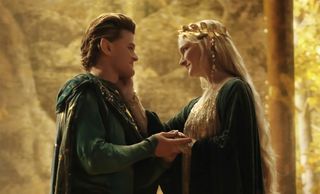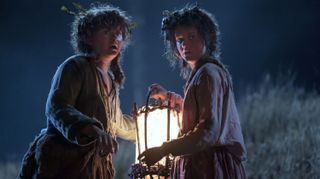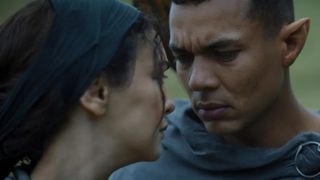The first episodes of The Rings of Power have a real 'unskippable cutscene' vibe
Amazon Studios' new The Lord of the Rings show is pretty, but also pretty dull, at least at the start.

When sitting down to play a new game, sometimes the wait between 'sitting down' and 'playing' is a gulf of unskippable cutscenes. That's not always a bad thing: the world needs explaining, the story needs an outline, the table needs to be set before you can jump up and start dancing on it. But it can be a bit dull sitting there, just waiting to play, while all the things that have already happened are explained so all the things that are about to happen, can happen.
The first two episodes of Amazon Studio's The Rings of Power, the television prequel series to The Lord of the Rings, aired late yesterday. The first episode in particular felt like one of those long, slow cutscenes that I want to skip by mashing my spacebar. Even as an LOTR fan, both of the books and films, I was bored, though things did pick up a bit in the middle of the second episode. I know some people have been saying HBO's new Game of Thrones series House of the Dragon is like doing homework, but if so, then the first couple episodes of The Rings of Power is like sitting through a professor's dry, droning lecture.
The Rings of Power takes place 3,000 years before The Lord of the Rings, but this is a world filled with immortal elves, primordial spirits, and ancient evils so there are still plenty of familiar faces and names. Most of the focus is on Galadriel, the courageous elven warrior determined to find and forever destroy the defeated Sauron. (Before his defeat in the Third Age in LOTR, Sauron was defeated in the Second Age, and before that, in the First Age. Name an Age, and this dude got his ass beat in it.)
The rest of the elves, including Elrond, not a ruler yet but a younger assistant to the regional manager, figure that since Sauron hasn't been seen lately, he's probably not worth worrying about. But Galadriel is insistent that just because you can't see evil doesn't mean it isn't still out there, plotting and festering and probably growing disgusting creatures in some sort of fleshy pods. You can probably guess who's right.
Meanwhile another elf, a soldier named Arondir, has been serving as an occupier of human lands because the humans sided with Morgoth (Sauron's boss, basically) against the elves. So, the elves don't trust humans, and the humans resent the elves' presence because frankly it's been generations since their lot threw in with Morgoth, and they don't think they should be blamed for what their ancestors did. And there are dwarves, naturally, bangin' around under the mountain at Moria where they've been for ages and yet haven't come up with a sport more interesting than smashing boulders with a hammer.
So far, despite a gulf of 3,000 years, this is all standard, completely recognizable stuff for anyone who saw the LOTR films. Elves are beautiful and arrogant, dwarves are gruff and jolly, and humans mostly suck and are not to be trusted. I guess for someone who's never read or seen The Lord of the Rings it's important to grasp those dynamics, but I found myself pretty impatient for the story to actually get rolling.

Thankfully there are hobbits around to stir things up a bit, and The Rings of Power shows us an earlier version of the halflings. Ages before they'd discovered a taste for pipe-weed and ornate underground homes, hobbits were more nomadic and migratory, and far more woodsy than refined. (They literally have twigs and leaves in their hair, messily cram berries into their mouths, and are in great need of the invention of bathtubs and napkins.) I'm happy with this, and it does a lot to explain the wanderlust of Bilbo, the durability of Samwise, and the curiosity of Pippin. The hobbits may have evolved into creatures of comfort, but they've got the DNA of world travelers, and we can finally see why.
The biggest gaming news, reviews and hardware deals
Keep up to date with the most important stories and the best deals, as picked by the PC Gamer team.
By the end of the second episode, thankfully, the wheels of the show finally begin turning. Galadriel is getting gaslit left and right that Sauron isn't a problem but isn't having any of it, defying tradition and orders and every other damn elf so she can get back to the quest she alone believes is important. Likewise, Arondir is ordered back to elf HQ, but seems reluctant to leave the humans because he's sweet on a healer named Bronwyn, and while looking for excuses to stick around he discovers there's some skulking evil creeping back into the world. A young hobbit meets a stranger and despite the fact that hobbits traditionally avoid interlopers, decides to help him. The big theme, I guess: don't always do as you're told, especially if everything within you is screaming that the rules and traditions of your elders are wrong.

But still, the show gets off to a sluggish start. Part of the problem for me is I find Tolkien's elves interminably boring. The Fellowship was perfect because for most of it you just had one elf around to do some sick archery and banter with a grouchy dwarf. That's the ideal amount of elf for a fantasy story. One. Otherwise you're just watching beautiful people standing around in expensive robes in front of setting suns and golden leaves, speaking as slowly as possible and entirely in metaphors.
Hopefully the little bit of momentum in the second episode continues and the series picks up the pace. It's also great to finally see diversity in The Lord of the Rings (I did not see the three hobbit movies, but the LOTR films were like 99% white dudes) and there are elves, hobbits, and dwarves played by people of color. Morfydd Clark, who plays Galadriel, is excellent, and I'd categorize the rest of the performances as "fine." And it's a beautiful looking show. It's the most expensive TV series ever, so at least it looks that way even while I'm impatiently hammering the spacebar in my head.

Chris started playing PC games in the 1980s, started writing about them in the early 2000s, and (finally) started getting paid to write about them in the late 2000s. Following a few years as a regular freelancer, PC Gamer hired him in 2014, probably so he'd stop emailing them asking for more work. Chris has a love-hate relationship with survival games and an unhealthy fascination with the inner lives of NPCs. He's also a fan of offbeat simulation games, mods, and ignoring storylines in RPGs so he can make up his own.
Most Popular


